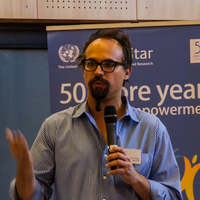
Anne Stephens
Lecturer in Education at James Cook University and Adjunct Senior Researcher, The Cairns Institute. Recent Visiting Fellow at the University of Hull, Centre for Systems Studies and Columbia University's School of International and Public Affairs. Research interests: Critical Systems Thinking, systemic evaluation research methodology and practice, and the GEMs Framework (Gender, Environments and voices from the Margins) for intersectional complexity analysis as it relates to the capacity development and educational systems supporting socio-ecological systems.
less
Related Authors
Carlos Garcia-Quijano
University of Rhode Island
David Seamon
Kansas State University
Joshua Cousins
SUNY: College of Environmental Science and Forestry
Kyle Whyte
University of Michigan
Dos Santos Silayo
Sokoine University of Agriculture
Umut Ulukan
ORDU UNIVERSITY
Vinzenz Hediger
Goethe-Universität Frankfurt am Main
Silvio Alovisio
Università degli Studi di Torino
Elena Dagrada
Università degli Studi di Milano - State University of Milan (Italy)
Sabrina Speich
École Normale Supérieure










Uploads
Papers by Anne Stephens
Based on training programs considered to be successful, the project was designed in order to gain an understanding of the dynamics of retention and completion towards employability. Nationally, for very remote Aboriginal and Torres Strait Islander trainees, completion rates for VET courses are on average 16.6%, with an even lower figure for certificate I courses.
Full details about the project and its cross-cutting findings, with a literature review and additional statistical information, are contained in the report, available from the NCVER Portal at <https://www.ncver.edu.au>. The case studies presented here mostly present qualitative findings.
capacity to balance various iterations of public policy against its vision for the future of Aboriginal and Torres
Straits Islanders. Community-controlled organisations wanting to contribute to economic and social develop-
ment in regional/remote Australia through the use of formally recognised vocational education and training
have adjusted to at least three major sociopolitical changes at the national policy level since the early 1990s.
These include redefining equity, marketising the delivery of public services and increased centralisation. The
contemporary orientation of vocational education and training as part of the Indigenous Advancement Strat-
egy has become a highly prescriptive and heavily centralised mechanism for the establishment of employment
outcomes. This has been framed as an obligation and right of Australian citizenship as opposed to the other
wellbeing and personal development benefits of education. This registered training organisation has navi-
gated four burdensome (re)definitions of equity that have made planning and delivery of true lifelong training
objectives difficult. The provider has embraced the marketisation of the sector and navigated other policy
changes in order to provide the services and knowledge set out in the college mission statement.
Based on training programs considered to be successful, the project was designed in order to gain an understanding of the dynamics of retention and completion towards employability. Nationally, for very remote Aboriginal and Torres Strait Islander trainees, completion rates for VET courses are on average 16.6%, with an even lower figure for certificate I courses.
Full details about the project and its cross-cutting findings, with a literature review and additional statistical information, are contained in the report, available from the NCVER Portal at <https://www.ncver.edu.au>. The case studies presented here mostly present qualitative findings.
capacity to balance various iterations of public policy against its vision for the future of Aboriginal and Torres
Straits Islanders. Community-controlled organisations wanting to contribute to economic and social develop-
ment in regional/remote Australia through the use of formally recognised vocational education and training
have adjusted to at least three major sociopolitical changes at the national policy level since the early 1990s.
These include redefining equity, marketising the delivery of public services and increased centralisation. The
contemporary orientation of vocational education and training as part of the Indigenous Advancement Strat-
egy has become a highly prescriptive and heavily centralised mechanism for the establishment of employment
outcomes. This has been framed as an obligation and right of Australian citizenship as opposed to the other
wellbeing and personal development benefits of education. This registered training organisation has navi-
gated four burdensome (re)definitions of equity that have made planning and delivery of true lifelong training
objectives difficult. The provider has embraced the marketisation of the sector and navigated other policy
changes in order to provide the services and knowledge set out in the college mission statement.
These are questions posed by a research project funded by the National Centre for Vocational Education Research, conducted by researchers from five jurisdictions. The researchers examined data from five different training programs considered successful in terms of retention and employability outcomes. One finding was that success is not dependent on employment outcomes. Another finding was that course completion is only one factor contributing benefit to learners. A third finding is that for some courses, employment leads to training, not the other way around.
This paper then problematizes the notion of transformative adult education in remote Aboriginal and Torres Strait Islander communities. To be transformative training systems do not need to be efficient (in terms of completion rates). However, to be transformative means ensuring that participants and communities benefit in ways that matter to them.
The proportion of remote Aboriginal and Torres Strait Islander learners holding VET qualifications is growing and the evidence shows they are engaging in VET in increasing numbers; however, qualification completion rates remain low and employment outcomes are not noticeably improving. Of real concern is that vocational training is not demonstrably translating into employment for many remote community learners.
Key to increasing the translation of training into employment is determining how retention and completion in VET can be improved, in conjunction with identifying how VET can enhance the employability of Aboriginal and Torres Strait Islanders living in remote communities. Also of importance is understanding the indicators of success — other than completion — and how these can be used to evaluate the outcomes of training in remote communities.
This project focused on providing insight by investigating five unique training programs. Specific sites were selected across remote Australia, each of which was considered to be successful in training and training completions in their respective communities. In each site students, trainers/training providers, employers, job service providers, community organisations and cultural advisors were interviewed to gain a wide range of perspectives on the factors that contribute to retention in training programs, as well as the indicators of successful training.